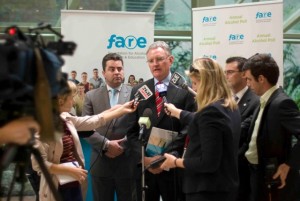The Essential Report Archive Read the latest report
Emergency service workers count the cost of booze-fuelled violence
Alcohol-fuelled violence is a major occupational health and safety issue for emergency service workers.
You see it every weekend – a fight outside a pub, the police have to break it, ambulance officers get attacked while treating the injured, and then emergency ward doctors and nurses are left to deal aggressive drunks until they’re fit to go home.
In fact, over 70 per cent of all assaults on police officers are related to alcohol-fuelled violence.
The Foundation for Alcohol Education and Research’s annual alcohol poll shows that alcohol-fuelled violence is not just a problem for emergency service workers – it’s something that has affected more than three out of every ten Australian.
More than one in every ten Australians has been a victim of alcohol-fuelled violence. Furthermore, 76 per cent of Australians say they were concerned about violence arising from excessive drinking.
These poll results show that alcohol-fuelled violence is a national issue, and it can no longer be ignored.
We simply cannot let alcohol abuse continue to play such a destructive role in our community.
The view from the front-line of policing is extremely confronting. Police officers can see the human cost of alcohol-fuelled violence – the physical injuries, the emotional toll, and the sheer pointlessness of it all.
Police officers, however, can also see the solution. And it’s right in front of our eyes – in the city of Newcastle.
A few years ago, the NSW Liquor Administration board imposed a series of restrictions on late night trading on 14 licensed venues in Newcastle, such as 3am closing times and 1.30am lock-outs.
A recent study by NSW Health showed there has been a 35 per cent decrease in the number of night-time non-domestic assaults reported to police in Newcastle since these measures were brought in.
There has also been a massive 50 per cent decrease in the night-time street offences in Newcastle.
These improvements have not been a flash in the pan – they have been sustained over three years, and have made Newcastle a safer place for everyone.
The Last Drinks coalition has been advocating for the Newcastle experience to be used as model for tackling alcohol-fuelled violence in other communities around NSW, and around Australia.
Put simply: we know we have a problem with alcohol-fuelled violence, but we also know what works, and how this problem can be brought under control.
State Governments really have no excuse for siting on their hands and continuing to let boozed-up idiots run amok every weekend around Australia.
Scott Weber is the President of the Police Association of NSW.
The Last Drinks coalition comprises doctors, nurses, paramedics and police officers.
For more information about the Last drinks campaign see www.lastdrinks.org.au
This article first appeared on Drink Tank 18 April 2012.
